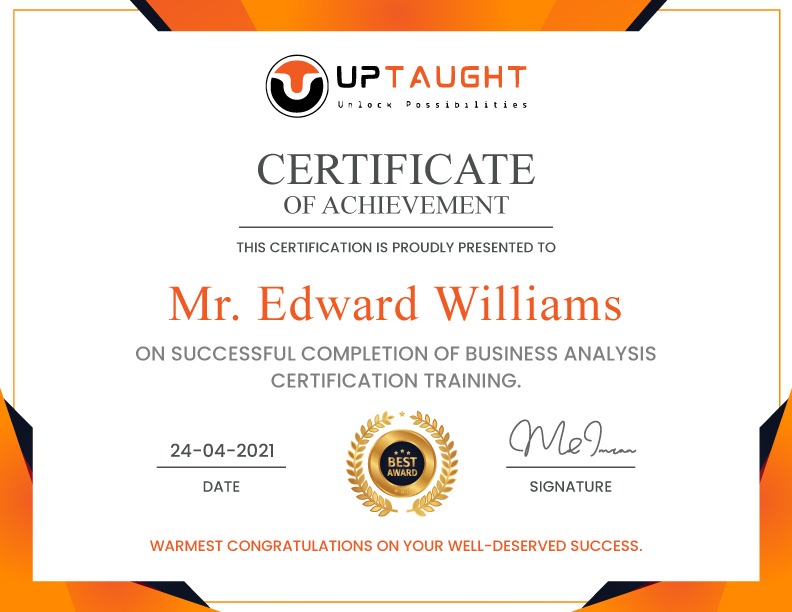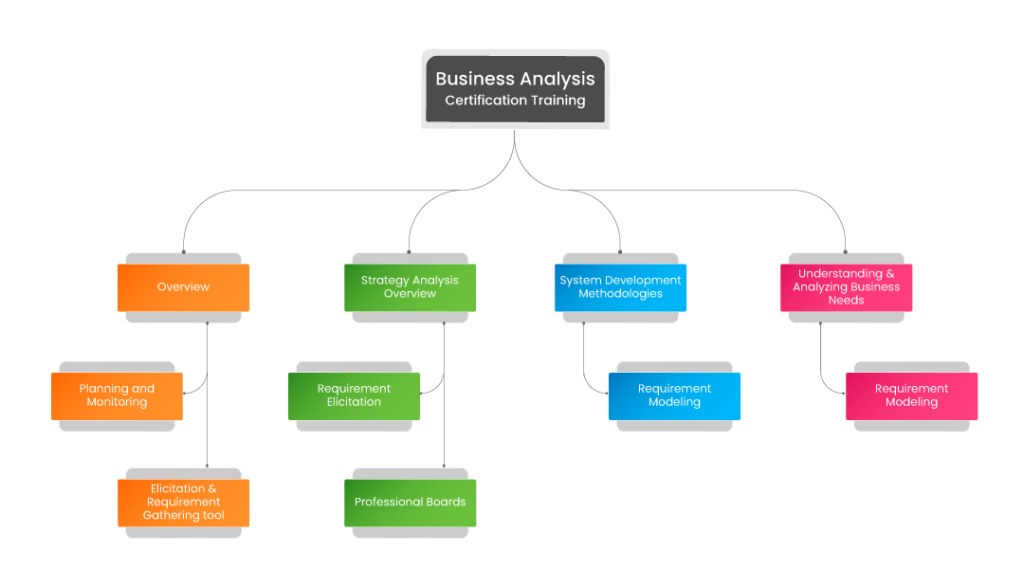Business Analysis Certification Training
Business Analysis is one of the most demanding courses which promotes your success and enhances the reputation of the career. This course will help you comprehend various business analysis techniques. You will acquire knowledge about business analysis planning and monitoring, form interactive dashboards, and comprehend the abilities of a Business Analyst.
The business analysis course will help you know the thorough concepts and skills required for a career as a business analyst. By the end of the Business Analysis fundamentals course, you will be in-depth with the need for business analyst’s roles & responsibilities, & necessities of the business analysis process, and the dissimilarities between a business analyst and a data analyst.
Boost the growth of your industry with the help of pedagogical tutoring methods that show you the opportunities and industrial skills required to be at the forefront of cloud security. Become a member today!
-
LevelAll Levels
Start Date
Time
Duration
Type
Mode of Training
Course Curriculum
Chapter 1 – Overview
-
Introduction IIBA, BABOK
-
What is Business Analysis?
-
Business Composition and Architecture
-
Who is a Business Analyst?
-
Need for Business Analyst
-
What is a Company?
-
Responsibilities of a Business Analyst
-
Positioning of Business Analyst
-
Standardization and Adaptability
-
Why is Communication/Collaboration important?
-
Demand of Business Analysis
-
Career Path
Chapter 2 – Strategy Analysis Overview
-
What is Strategy Analysis?
-
Components
-
Identify Business needs & Stakeholders
-
Techniques
Chapter 3 – System Development Methodologies
-
Agile: Explain Agile
-
Scrum
-
Scrum Basics
-
Sprint
-
Product Backlog
-
Sprint Backlog
-
Burn down chart
-
Sprint Planning Meeting
-
Stand-up meeting
-
Waterfall method
-
Different phases of SDLC
-
Requirement Phase/BA’s role
-
Rapid Application Development (RAD)
-
Spiral
-
Agile and JIRA
-
JIRA – Introduction
-
JIRA tool registration( Trail Version)
-
JIRA – Dashboard
-
Managing Product backlog
-
Sprint Creation
-
Managing Sprint Backlog
-
Creating sub tasks
-
Sprint Progress and logging work
-
Reporting defects
-
Sprint Closer
-
Introduction to several Requirement types
-
User/Business Requirements
-
Functional Requirements
-
Non-Functional Requirements
-
Transition Requirements
-
UI (User Interface) requirements
-
System Requirements
Chapter 4 – Understanding & Analyzing Business Needs
Chapter 5 – Planning & Monitoring
-
Approach
-
Engagement
-
Governance
-
Information Management
-
Identify Performance Improvements
Chapter 6 – Requirement Elicitation
-
Requirements Work Plan
-
BA Role in Requirements Planning
-
Approaches
-
Techniques
Chapter 7 – Requirement Modeling
-
What is Requirement Modeling
-
Types
-
How to Prioritize requirements
-
Traceability
-
Sign-off & Management
-
Requirement Documentation
Chapter 8 – Requirement Modeling
-
What is Requirement Modeling
-
Why REquirement Modeling
-
What is Process Management
-
AS-IS Vs. TO-BE Modeling
-
Prototyping
-
UML
-
Verify & Validate Requirements
Chapter 8 – Elicitation & Requirement Gathering tool
Chapter 9 – Professional Boards
-
International Institute of Business Analysis (IIBA)®
-
IREB (International Requirements Engineering Board)
-
PMI (Project Management Institute)
-
BCS (British Computer Society)
Business Analysis Certification Training
-
LevelAll Levels

Jerome
CBAP Certified from IIBA, PMP
Instructor Description:
- 14 years of experience as a Business Analyst in both IT and non IT background.
- Significant contribution to the success of projects in BFSI, Retail, Process and Services, Solutions, Product Development.
- Served as a senior business analyst and project manager many times during his career.
- Appreciable leadership skills and has trained huge number of professionals in different organisations.
- Corporate trainer with 8 years of experience as a Successful mentor
- Member of IIBA,ISTD.
Roadmap

Salary range
FAQs
It is harder to become a business analyst than most operational jobs but easier than technical jobs.
A business analyst is a person who analyzes and helps businesses to improve their processes, products, services and software.
Business analysts generally bridge the gap between the business ideas and business capabilities
Once the business analyst has enough knowledge, then he can move to the project management and consultant roles.
Yes, if you are an IT business analyst.
Almost every industry requires business analysts. However, most of the jobs are in IT or management consulting firms.
The average salary of business analysts is $74260 in the US.
The skills required are:
Analysis Problem solving capabilities
Interpersonal skills
Consultative skills
You require a bachelor degree in any discipline, though a degree in computing, economics, or numeracy-related subject is preferable.
In certain top and reputed organizations, an MBA or equivalent degree is mandatory. However, a non-MBA can also become a Business analyst.
It will be 40 Hours of training. You can choose either Instructor-led training or SPVT.
Yes, SQL knowledge is a prerequisite for almost any business analyst job.
Business analysts use Microsoft Excel.
After the certification training programme, you will be industry-ready and can expect to have good job opportunities.
No.




